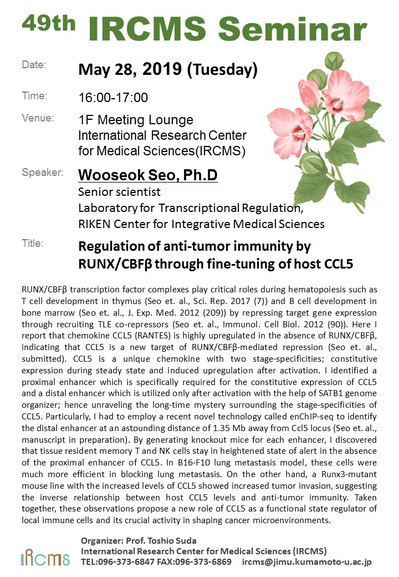- HOME
- IRCMS Seminars
- [May 28] 49th IRCMS Seminar
IRCMS Seminars
[May 28] 49th IRCMS Seminar
May 20 2019
We would like to inform you that the 48th IRCMS Seminar has been scheduled as below. We would be pleased to see many of you participating in the seminar.
Date : May 28, 2019 (Tuesday)
Time : 16:00-17:00
Venue : IRCMS 1F Meeting Lounge
Speaker : Wooseok Seo, Ph.D
Senior scientist
Laboratory for Transcriptional Regulation,
RIKEN Center for Integrative Medical Sciences
Abstract:
RUNX/CBFβ transcription factor complexes play critical roles during hematopoiesis such as T cell development in thymus (Seo et. al., Sci. Rep. 2017 (7)) and B cell development in bone marrow (Seo et. al., J. Exp. Med. 2012 (209)) by repressing target gene expression through recruiting TLE co-repressors (Seo et. al., Immunol. Cell Biol. 2012 (90)). Here I report that chemokine CCL5 (RANTES) is highly upregulated in the absence of RUNX/CBFβ, indicating that CCL5 is a new target of RUNX/CBFβ-mediated repression (Seo et. al., submitted). CCL5 is a unique chemokine with two stage-specificities; constitutive expression during steady state and induced upregulation after activation. I identified a proximal enhancer which is specifically required for the constitutive expression of CCL5 and a distal enhancer which is utilized only after activation with the help of SATB1 genome organizer; hence unraveling the long-time mystery surrounding the stage-specificities of CCL5. Particularly, I had to employ a recent novel technology called enChIP-seq to identify the distal enhancer at an astounding distance of 1.35 Mb away from Ccl5 locus (Seo et. al., manuscript in preparation). By generating knockout mice for each enhancer, I discovered that tissue resident memory T and NK cells stay in heightened state of alert in the absence of the proximal enhancer of CCL5. In B16-F10 lung metastasis model, these cells were much more efficient in blocking lung metastasis. On the other hand, a Runx3-mutant mouse line with the increased levels of CCL5 showed increased tumor invasion, suggesting the inverse relationship between host CCL5 levels and anti-tumor immunity. Taken together, these observations propose a new role of CCL5 as a functional state regulator of local immune cells and its crucial activity in shaping cancer microenvironments.

